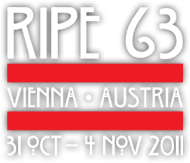With 465 people checked in, RIPE 63 was the biggest RIPE Meeting so far.
Monday, 31 October
RIPE 63 Plenary Sessions
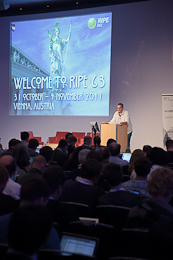
The RIPE 63 Meeting began Monday afternoon with welcome addresses from Rob Blokzijl, RIPE Chair, and the RIPE Meeting hosts, Christian Panigl, UniVie/ACOnet/ VIX, and Robert Schiscka, nic.at. Désiree Miloshevic, Oxford Internet Institute, then gave an introduction of the results of the recent RIPE NCC Membership and Stakeholder Survey 2011 and explained to the attendees that there would be more details given in the RIPE NCC Services Working Group session on Wednesday at 16:00.
More information about the survey.
The Plenary continued with a detailed presentation by Emile Aben, RIPE NCC, on “World IPv6 Day – What Did We Learn?”. He showed statistics from the day itself and concluded that it was a positive experience. Brian Nisbet, HEAnet, gave the first technical presentation of the week and had attendees laughing out loud at his amusing account of HEAnet’s experience with “Cisco CRS-1 & IOS-XR”.
The second Plenary session opened with an emotive speech from RIPE NCC’s Chief Scientist, Daniel Karrenberg entitled “Almost 20 Years of RIPE NCC: A Personal View on Current Challenges”. It was followed by a high-level panel discussion on resource certification/RPKI. The discussion, moderated by Olaf Kolkman of NLNet Labs, saw debate on the technical and potential regulatory issues surrounding certification. The participants were Malcolm Hutty, LINX; David Freedman, Claranet; Sandra Murphy, Sparta, co-chair of the IETF Secure Inter- Domain Routing WG; and Steven Kent, BBN. The discussion examined many of the issues surrounding certification, answering some questions and opening a number of other areas for exploration throughout the meeting week.
RPKI Workshop
Earlier in the day, a RPKI workshop was held. Around 80 people participated. They were able to make use all of the available open-source tools and configure routers to base routing decisions on RPKI data.
Got Legacy Space? Register It!
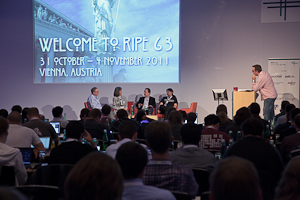
Some RIPE 63 attendees received a special letter in their meeting pack asking them to get in touch with the RIPE NCC to register their legacy address space. This is the first step in a phased implementation to contact as many legacy space holders as possible in the RIPE NCC service region. Keeping the RIPE Registry comprehensive, accurate and up-to-date is one of the RIPE NCC’s key responsibilities as a Regional Internet Registry (RIR). Stop by the RIPE NCC Info Hub to talk to RIPE NCC staff or pick up a brochure for more information.
Database Tricks and Tips
Around 35 people attended the “Database Tricks and Tips” session, run by the RIPE NCC, on Monday morning. The session introduced attendees to the most important objects in the RIPE Database, showed simple ways to get precise information and explained the best methods for updating the database. There was also some discussion of geolocation and, based on positive feedback, the session may be offered again at future RIPE Meetings.
Abuse Contact Management Task Force
The Abuse Contact Management Task Force held their fourth meeting on Monday morning. The goal of the task force is to propose a solution for abuse contact provision by members. The task force will report back to the Anti- Abuse Working Group on Tuesday afternoon. The task force also came up with a policy proposal outline that will be submitted in the coming weeks.
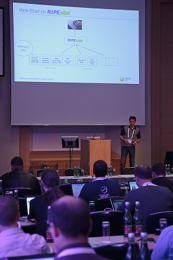
BoF: RIPEstat Demo
The RIPEstat demo took place during Monday’s BoF session. The demo gave an overview of the purpose of RIPEstat, explained some features related to the application’s views, mentioned the new iPhone/iPad version that was released yesterday and outlined upcoming features. There was a live demonstration of two use cases: finding a spammer and checking global visibility. Attendees were invited to stop by the RIPE NCC Info Hub, located by the Registration Desk, to present use cases for the chance to win a prize.
More information about RIPEstat and the demos.
Tuesday, 1 November
Operational Focus at Tuesday’s Plenary Sessions
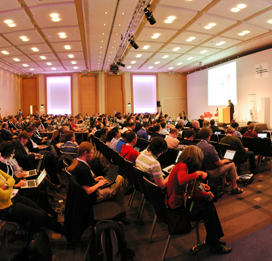
Day 2 of RIPE 63 began with a busy Plenary session, opened by Yaroslav Rosomakho, Arbor Networks, with “DDoS Attack Trends Through 2009-2011”, which prompted some discussion. Kyle Creyts, Merit Network Inc, then presented “The Reputation of Networks – RIPE Region”. Martin Pels, AMS-IX followed him onto the podium with “Operational Experiences in Deploying 100 GbE”.
Wolfgang Nagele, RIPE NCC, then presented “IPv4 and IPv6 assignments for RIPE NCC Routing Information Service” and Marco Hogewoning, RIPE NCC, talked about the “Resource Request for Business Operations”. There were several comments from the audience about this and it was left to the community to decide the outcome during the Closing Plenary.
The second Plenary session continued the focus on technical issues, starting with a presentation on transit costs by Fredy Kuenzler, Init7. Pierre Francois of Paolo Lucente followed this with a very detailed presentation on “BGP Policy violations in the data-plane”.
Antonio Marcos Moreiras from the Brazilian Network Information Center delivered an analysis of IPv6 latencies, compared to IPv4 and also over time, which identified positive news regarding IPv6 performance generally, but also some specific areas for concern. Cassio Sampaio, Sandvine Inc., continued the IPv6 theme with his study of “Measured Trends in IPv6 Adoption”, looking particularly at trends seen around and following World IPv6 Day.
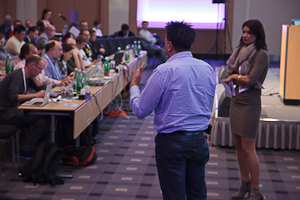
Plenary Continues: Legacy Space and IPv6
The RIPE NCC’s Managing Director, Axel Pawlik, shared the RIPE NCC’s plan for contacting legacy space holders in the RIPE NCC service region. The presentation prompted a lot of participation from the audience, many of whom were legacy space holders themselves. Axel encouraged legacy space holders, even those with particularly specific situations, to visit RIPE NCC staff at the RIPE NCC Info Hub for more information. RIPE Chair Rob Blokzijl supported the efforts to “blow the dust off” of legacy address space.
IPv6 remains a hot topic at RIPE Meetings. George Michaelson from APNIC shared his views on the “IPv6 Deployment Beauty Pageant” and jokingly discouraged everyone from clicking on the IPv6 flash banners on the APNIC website because each click costs them money. The last item of the session was a four-person panel discussing “CPE and End-User IPv6”. The panel, chaired by Andrei Robachevsky, ISOC, included: Hans Liu, D-link; Ole Troan, Cisco; Eric van Uden, AVM; and Carl Wuyts, Technicolor/Thomson. Audience comments indicated that having hardware providers speaking about IPv6 deployment was an encouraging indication that things were moving in the right direction.
Anti-Abuse Working Group Session
There was a good mix of the technical, the practical and the policy at the Anti-Abuse Working Group session today. João Damas, ISC, gave an interesting presentation on passive DNS. Laura Cobley, Customer Services Manager at the RIPE NCC, spoke about how to report abuse to the RIPE NCC. She received many helpful suggestions on how the process should work. Michele Neylon, Blacknight, changed the theme from numbers to names, updating on how hosting companies deal with abuse. The session ended with a range of attendees discussing the interactions the Internet community has with governments and legal enforcement agencies.
IPv6 Working Group Session
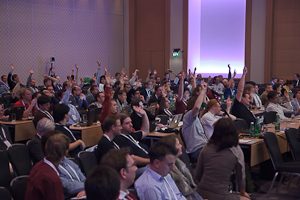
Shane Kerr, ISC, gave a presentation on renumbering for enterprise networks and the IETF Working Group that has been established to look at this issue, seeking operator feedback on their work. Jan Žorž, go6.si, and Sander Steffann discussed the update to RIPE Document, ripe-501, “Requirements for IPv6 in ICT Equipment”, which will conclude its Last Call phase next week. Constanze Bürger delivered an update on the German government’s roll-out of a federal IPv6 network, which led to some discussion of the role of government and the cost to taxpayers of IPv6 deployment. Timo Hilbrink, XS4ALL, provided an update on the IPv6 deployment of Dutch ISP XS4ALL.
Next, several interesting Lightning Talks were held, including “Results of the 2011 Global IPv6 Deployment Monitoring Survey”, “Effects of Capacity Building on IPv6 Adoption” and “Deployment and Stateless IPv4 over IPv6 in 5 Minutes”.
David Kessens reported from a draft document currently reviewed by the IETF: “IANA Reserved IPv4 prefixes for shared CGN space” and urged everyone to look at the draft and participate in the discussion.
At the end of the session, Marco Hogewoning introduced “speed dating” between those who have deployed IPv6 and those busy deploying it. He said that the community, and especially the IPv6 WG, is a great pool of resources on IPv6 deployment. Attendees were encouraged to help each other.

Wednesday, 2 November
Address Policy Working Group Session
Emilio Madaio, RIPE NCC Policy Development Officer, gave on overview of “Current Policy Topics” and the “Policy Development Office Activities”. Alex le Heux, RIPE NCC, continued with “Feedback from RIPE NCC Registration Services”, showing how the implementation can take from days to years.
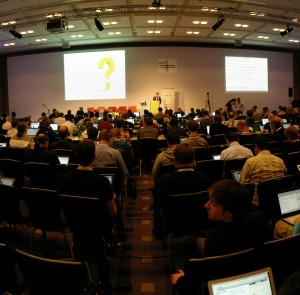 The APWG co-Chairs announced their intention to declare consensus on proposal 2011-02, “Removal of multihomed requirement for IPv6 PI”. 2011-04, “Extension of the Minimum Size for IPv6 Initial Allocation”, was presented and discussed: it was agreed that extending an IPv6 allocation from a /32 to a /29 should not be used exclusively for one transitioning technique. Proposal 2011-05, “Safeguarding future IXPs with IPv4 space”, was presented by Andy Davidson and received some support in the room after receiving a lot of support on the mailing list. The wording will be updated and then discussion will continue.
The APWG co-Chairs announced their intention to declare consensus on proposal 2011-02, “Removal of multihomed requirement for IPv6 PI”. 2011-04, “Extension of the Minimum Size for IPv6 Initial Allocation”, was presented and discussed: it was agreed that extending an IPv6 allocation from a /32 to a /29 should not be used exclusively for one transitioning technique. Proposal 2011-05, “Safeguarding future IXPs with IPv4 space”, was presented by Andy Davidson and received some support in the room after receiving a lot of support on the mailing list. The wording will be updated and then discussion will continue.
Dave Wilson, HEAnet, gave an overview “On Inter-RIR Transfers” and asked for discussion on whether we need an inter-RIR transfer policy. The RIPE NCC was requested to evaluate the current transfer policy. The community was encouraged to discuss on the AP mailing list whether a transfer policy for inbound addresses from other RIRs is necessary. Rob Blokzijl introduced his initiative for the “IPv4 Maintenance Policy” document. The document will be sent to the mailing list shortly and feedback is encouraged. Shane Kerr, ISC, was then invited to explain the conclusions from yesterday’s IPv6 WG session about IPv6 renumbering: some difficulties were highlighted and more results will be posted in the mailing list. The last item on the agenda was a review of the withdrawn policy 2008-08, “Initial Certification Policy in the RIPE NCC Service Region”. The difference between policy and the “Certification Practice Statement” was clarified.
Routing Working Group Session
Geoff Huston, APNIC, presented the mystery of “The Flat World of BGP” – while the table grows, the number of BGP updates does not grow significantly. Thomas Mangin presented on exaBGP and asked for feedback. Randy Bush, IIJ, presented on the “Impact of the Tohoku Earthquake on Japanese ISPs” and concluded this was a boring event; the Internet worked around failures. He also presented on the CPU load of BGPSEC. Daniel Karrenberg, RIPE NCC, asked for input on the usefulness of RIS routing beacons. The responses were that they were useful. There was an action on the RIPE NCC to publish the IPv6 Routing Recommendations document.
ENUM Working Group Session
The ENUM WG started with Wolfgang Nagele, RIPE NCC, giving an update of the RIPE NCC’s ENUM service. Patrik Fältström, Cisco, joined the session by telephone to give a short presentation called “User ENUM in +46”. The third presenter was Lino Santos, reporting about ENUM progress in Portugal. Most of the WG session was covered by an interesting panel discussion with ENUM experts from various countries – Austria, Portugal, UK, Czech Republic, Sweden – and a speaker from TERENA. The discussion was focused around why ENUM is not terribly successful and if ENUM itself is a service or if it is an underlying technology on which services can be based. One of the conclusions was that it would good if all ENUM operators would collaborate more rather than acting like competitors. An action was assigned to contact all ENUM operators between now and RIPE 64.
RIPE NCC Services Working Group Session
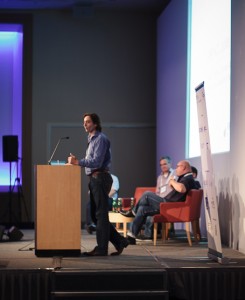 The RIPE NCC Services Working Group was the final session of the day. Following an introduction to the newly composed Senior Management team by Axel Pawlik, RIPE NCC Managing Director, there was an update from the RIPE NCC Senior Managers on the organisation’s various activities, priorities and developments. Paul Rendek, RIPE NCC Director of External Relations, then summarised the results of the RIPE NCC Membership and Stakeholder Survey 2011, and Andrea Cima, Registration Services Manager, provided an update on the RIPE NCC’s preparation for the distribution of the last remaining IPv4 address space and the associated business processes. Ingrid Wiijte, Registration Services Assistant Manager, reported on the progress of the RIPE NCC’s project on Contractual Relationship Requirements for End Users. Finally, Daniel Karrenberg, RIPE NCC Chief Scientist, reported on the development and future plans for RIPE Atlas.
The RIPE NCC Services Working Group was the final session of the day. Following an introduction to the newly composed Senior Management team by Axel Pawlik, RIPE NCC Managing Director, there was an update from the RIPE NCC Senior Managers on the organisation’s various activities, priorities and developments. Paul Rendek, RIPE NCC Director of External Relations, then summarised the results of the RIPE NCC Membership and Stakeholder Survey 2011, and Andrea Cima, Registration Services Manager, provided an update on the RIPE NCC’s preparation for the distribution of the last remaining IPv4 address space and the associated business processes. Ingrid Wiijte, Registration Services Assistant Manager, reported on the progress of the RIPE NCC’s project on Contractual Relationship Requirements for End Users. Finally, Daniel Karrenberg, RIPE NCC Chief Scientist, reported on the development and future plans for RIPE Atlas.
PGP Key-Signing Party
The PGP Key-Signing Party has been a regular feature at the last few RIPE Meetings, and RIPE 63 was no exception. While cryptography ensures the secrecy of communication, it is important to establish a “web of trust” so that the authenticity of the involved parties is also known with a high degree of confidence. The RIPE Meeting presents an ideal opportunity for attendees to meet, exchange, verify and sign each other’s public keys. Yesterday’s Key-Signing Party was attended by 10-15 people and will be continued at future RIPE meetings.
Thursday, 3 November
Address Policy Working Group – Session III
The third AP WG session started on Thursday with discussion on the IPv6 PI/PA unification proposal made by Gert Doering, AP Working Group co-Chair. After an overview of the history and some statistics about IPv6 policy in the RIPE community, there was an analysis of special cases, the costs and the “multiple blocks per LIR” scenario that would result from the unification. The RIPE NCC was tasked to look into reasons why LIRs would like to be able to request multiple prefixes. More feedback was encouraged on the mailing list.
During the Open Policy Hour, Kurtis Lindqvist presented the recent RFC 6382, published by the IETF. He highlighted some possible interpretation issues with the ripe-525 policy, “Autonomous System (AS) Number Assignment Policy”. The attendees present reached the conclusion that a policy proposal should not be submitted.
DNS Working Group Session
The first session of the DNS WG Session had a diverse set of presentations, ranging from an update by the RIPE NCC, an update on the DANE work in IETF, to DNS configuration management and two different implementations of an authoritative DNS server.
The second DNS session started with an interesting presentation by Wolfgang Nagele, RIPE NCC, about the excessive increased query load on the root name servers that occurred for a brief time this summer. It was followed by Olaf Kolkman, NLnet Labs, presenting “DNSSEC Trigger”, an useful application for testing DNSSEC from behind “hostile” networks like NATs and hotel networks etc. Joe Abley, ICANN, presented an update on the “IDN Variant Issues Project”, then Stephane Bortzmeyer, AFNIC, updated the attendees on the status of the DNSEASY and SSR Meetings.
The session ended with a very engaging panel discussion, ranging from the technical to the political implications of blocking or rewriting DNS query results at the registry or ISP level and how that affects operators throughout the world.
EIX Working Group Session
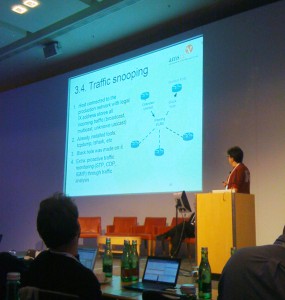 Christian Panigl, VIX, gave the first presentation of the session with his introduction to the local peering scene in Austria. Andy Davidson, EIX WG co-Chair, gave an update on EIX activities, including the new IPv4 policy and switch wishlist. Remco van Mook, Equinix, and Martin Pels, AMS-IX, offered to help with the document. The session continued with a presentation from Harald Michl, UniVie/ACOnet/VIX on “Monitoring Platforms for Internet Exchange Points“. A presentation from Maksym Tulyuk on “Jumbo Frames in AMS-IX” prompted many in the audience to voice their opinions.
Christian Panigl, VIX, gave the first presentation of the session with his introduction to the local peering scene in Austria. Andy Davidson, EIX WG co-Chair, gave an update on EIX activities, including the new IPv4 policy and switch wishlist. Remco van Mook, Equinix, and Martin Pels, AMS-IX, offered to help with the document. The session continued with a presentation from Harald Michl, UniVie/ACOnet/VIX on “Monitoring Platforms for Internet Exchange Points“. A presentation from Maksym Tulyuk on “Jumbo Frames in AMS-IX” prompted many in the audience to voice their opinions.
Ondrej Filip, NIX.CZ, began the second EIX WG session with his presentation “Extended Communities for Route-Servers and ASN32“. He also announced that NIX.CZ is celebrating its 15th anniversary and invited everyone to a party on 21 November. Up next was Kurtis Lindqvist, Netnod, who presented on “How to Resolve Edge Redundancy for Peering“. Next up was Joao Damas, ISC, who talked about the Open Source Routing project he was working on. Wolfgang Tremmel, DE-CIX, and Maksym Tulyuk, AMS-IX, gave presentations on the problems they experienced with Proxy-ARP. Discussion focused on why this happened and audience consensus revealed this could be fixed by Cisco not making proxy-ARP on by default. A Cisco representative said that he would bring this feedback back to Cisco. Bijal Sanghani, Euro-IX, shared an update with attendees and the session ended with on open mic session of lightning updates.
RIPE Database Working Group Session
The RIPE NCC shared the latest RIPE Database developments. RIPE NCC staff members, Kaveh Ranjabar and Denis Walker, presented on the action points from the RIPE 62 Meeting, all of which have been completed. Regarding the concerns raised during RIPE 62, the RIPE NCC found that 99.15% of the INETNUM objects created by LIRs were authenticated with a password. The WG Chair suggested that a task force could be formed to look at the authentication methods and the issue of having the MD5 hash publicly available. The main discussion of the session was about the geolocation service. The RIPE NCC showed a prototype of the service and the WG Chair will present the proposed way forward on the RIPE Database mailing list. Richard Barnes, BBN Technologies, gave a presentation talking on geolocation options and data privacy. It was not yet decided whether the RIPE NCC will maintain all the data or if each ISP will decide how much data will be publicly available. The RIPE NCC was also requested to investigate how internationalisation could be made possible and what would need to be done if it is decided to fully serve the data in utf-8. Also, as reported in the Anti-Abuse WG earlier this week, a requirement of an abuse contact in the RIPE Database will start the PDP in the coming weeks. This is the result of the Abuse Contact Task Force. An other issue raised was that objects sponsored by an LIR are not shown in the RIPE Database. The mailing list will be used to analyse how to move forward.
Cooperation Working Group Session
The RIPE Cooperation Working Group met in the final session of the day, and included a remote presentation from European Commission representative Andrea Glorioso, who emphasised the need for more synchronisation between the RIPE community and the Commission. Chris Buckridge, RIPE NCC, gave an update on the Internet Governance Forum 2011, while Nurani Nimpuno, Netnod, spoke about the work of the United Nations CSTD Working Group on “Improvements to the IGF”. This led to a longer discussion of the various forums in which Internet governance is discussed and how best to participate and respond to the range of Internet governance issues.
MAT Working Group Session
The session started with Antonio Moreira, NIC Brazil, reporting on how RIPE TTM data is being used in real time in Brazil. Tiziana Refice, Google, presented the “Measurement Lab (M-Lab)” they are setting up at Google. After the talk, several people asked if Google was considering integrating or sponsoring RIPE Atlas. There was applause from the audience about this point. Wolfgang Nagele, RIPE NCC, presented on “PCAP Analysis with HADOOP”. More information about this can be found on RIPE Labs. The session concluded with two presentations by the RIPE NCC. Vesna Manojlovic, Senior Community Builder, updated the audience on the recent developments in the RIPE NCC’s measurements activities and Robert Kisteleki, Research and Development Manager, announced the introduction of user defined measurements for RIPE Atlas. This last presentation prompted a lot of discussion. David Freedman, Claranet, asked the audience how the reachability of a prefix could be measured so that people can build filters properly and proposed an experiment. Interest was expressed and he said he would formulate a more solid proposal.
IPv6 Privacy BoF
An IPv6 Privacy BoF was held in the Park Congress I room following the last working group sessions of the day. The German NGO Arbeitskreis Vorratsdatenspeicherung’s (Working Group on Data Retention) position on how user privacy should be supported by ISPs and software/hardware vendors was discussed as well as how privacy concerns will influence ISPs’ IPv6 assignment practices.
Friday, 4 November
NRO/RIR Reports
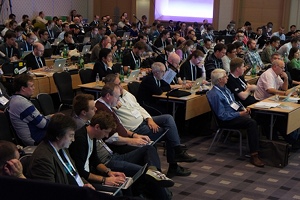 Friday morning’s Plenary began with updates from the other four Regional Internet Registries (RIRs). Adiel A. Akplogan, CEO, gave the AfriNIC Update remotely. Paul Wilson, Director General, gave the APNIC update, Nate Davis, Chief Operating Officer, gave an overview of ARIN’s activities and Luisa Villa, Customer Services Manager, gave the LACNIC Update.
Friday morning’s Plenary began with updates from the other four Regional Internet Registries (RIRs). Adiel A. Akplogan, CEO, gave the AfriNIC Update remotely. Paul Wilson, Director General, gave the APNIC update, Nate Davis, Chief Operating Officer, gave an overview of ARIN’s activities and Luisa Villa, Customer Services Manager, gave the LACNIC Update.
Axel Pawlik, Managing Director, RIPE NCC, also gave an update on the Number Resource Organization (NRO) Executive Council (EC) activities and Andrea Cima, Registration Services Manager, RIPE NCC, presented a global overview of allocation and assignment statistics. Filiz Yilmaz, Senior Director of Participation and Engagement, ICANN, gave the IANA Update.
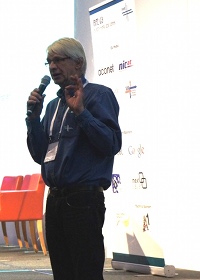
The Closing Plenary began with Geoff Huston, Chief Scientist, APNIC, giving an entertaining and informative presentation on IPv4 exhaustion. He advised the RIPE community that one working Internet requires keeping an eye on the global picture. He said addresses should be used in working networks instead of being hoarded. He concluded that a rapid exhaustion of IPv4 represents the best chance of achieving an IPv6 network.
Lightning Talks
Next on the agenda were three IPv6-related lightning talks. Dave Wilson, HEANET talked about “Lessons from World IPv6 Day“, Antonio Marcos Moreiras, NIC.br, announced “LAC IPv6 Week” taking place from 6-12 February, 2012 and Jen Linkova, Google, talked about the “World IPv6 Event“. Randy Bush, IIJ, ended the lightning talk round with his talk on “RPKI Validation Performance“.
RIPE Programme Committee
The RIPE Programme Committee (PC) held elections for the revolving vacant seat. The audience thanked Rob Evans, who is standing down from the PC, for his work and the three candidates, Harald Michl, Piotr Strzyzewski and Filiz Yilmaz, gave a brief speech about themselves and their motivation. Filiz Yilmaz was elected by the attendees in the room by show of hands.
It was announced that Joao Damas, IRC, was standing down from the Programme Committee. He received a standing ovation for his efforts in coordinating the RIPE Meeting plenary content over the last several years. Brian Nisbet, HEANET, was welcomed as his replacement.
Earlier in the week, Wolfgang Nagele, RIPE NCC, had given a presentation on “IPv4 and IPv6 assignments for RIPE NCC Routing Information Service (RIS)”, asking if the RIPE NCC could keep using its assigned address block. Rob Blokzijl, RIPE Chair, asked the Plenary if it agreed. The attendees present agreed by show of hands.
Marco Hogewoning, RIPE NCC, gave an update on the “Resource Request for Business Operations” that he had presented earlier in the week. He said that he had received feedback from the community over the week and the request was revoked as a result.
Nigel Titley, Chairman of the RIPE NCC Executive Board, announced that Wilfried Woeber had been selected as the RIPE NCC Executive Board appointee to the NRO Number Council (NC).
Erik Romijn, RIPE NCC, gave the RIPE 63 Technical Report. A report from the Secret Working Group followed and Rob Blokzijl closed the RIPE 63 Meeting with a short overview of meeting statistics, thanked the meeting hosts, the organisation team and the attendees and encouraged everyone to take part in the RIPE 64 Meeting, Ljubljana, Slovenia.
